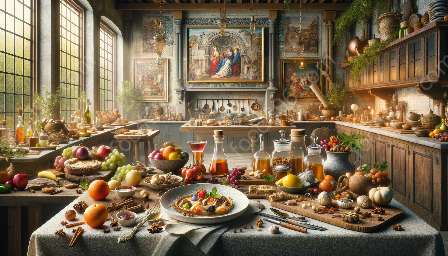The Renaissance period marked a transformative era in the history of food, significantly shaping culinary traditions and social interactions. This article will delve into the intriguing role of food in Renaissance society, exploring its impact on culinary history and the evolution of cuisine during this remarkable time.
Renaissance Society and Food
In Renaissance society, food held a multifaceted role, serving as a symbol of wealth, power, and social status. Banquets, feasts, and lavish meals were not only demonstrations of culinary prowess but also served as political and social tools, showcasing the host's influence and prestige. The dining table became a stage for entertainment and display, where elaborate dishes and exotic ingredients were used to impress and communicate social standing.
Moreover, the Renaissance era witnessed a significant shift in the cultivation and availability of food. The exploration and expansion of trade routes introduced novel ingredients and flavors to European cuisine, transforming traditional culinary practices. The increasing availability of exotic spices, fruits, and vegetables not only enriched the gastronomic landscape but also reflected the interconnectedness of global trade and the impact of exploration on food culture.
Renaissance Cuisine History
The history of Renaissance cuisine is a tapestry of culinary innovation, cultural exchange, and social dynamics. The period saw the emergence of influential cookbooks and culinary treatises that documented the evolving practices and preferences in food preparation and dining etiquette. These culinary writings not only provided insights into the gastronomic preferences of the time but also reflected the intricate relationship between food, culture, and societal norms.
Renaissance cuisine history also witnessed the rise of professional chefs and culinary artists who played an instrumental role in shaping the culinary landscape. Their expertise and creativity contributed to the development of sophisticated cooking techniques and the cultivation of refined palates among the elite class. As culinary arts flourished, kitchens became centers of culinary experimentation, where new flavors and culinary fusions were explored, leading to the evolution of distinctive regional cuisines and culinary traditions.
Impact on Cuisine History
The influence of Renaissance society on cuisine history is undeniable, as it laid the foundation for many enduring culinary practices and traditions. The interaction between different cultures, the exploration of new lands, and the exchange of culinary knowledge all left an indelible mark on the evolution of food and culinary arts.
Renaissance cuisine history serves as a testament to the enduring impact of food on society, as it transcended mere sustenance to become an art form, a status symbol, and a means of cultural expression. The interplay of social, economic, and cultural factors during the Renaissance period shaped the culinary landscape, giving rise to culinary legacies that continue to influence modern gastronomy.

